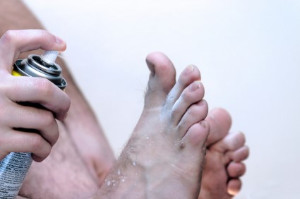6650 Frankford Ave
Philadelphia, PA 19135
 A common fungal skin infection is known as athlete’s foot. Athlete’s foot is contagious, and can be spread by not wearing the proper footwear in places where fungus thrives, such as swimming pools and communal showers. Scaly, itchy rashes between the toes are often a key indicator that you have developed this uncomfortable condition. To help relieve this discomfort, over the counter powders, sprays, ointments, and lotions may be beneficial for your case. Using hydrogen peroxide can also be useful in killing the fungus on the surface of the skin. Making sure your feet are clean and dry is another great first step in preventing the infection from worsening. For a proper diagnosis and advice on which treatment may be best for you, please speak with a podiatrist.
A common fungal skin infection is known as athlete’s foot. Athlete’s foot is contagious, and can be spread by not wearing the proper footwear in places where fungus thrives, such as swimming pools and communal showers. Scaly, itchy rashes between the toes are often a key indicator that you have developed this uncomfortable condition. To help relieve this discomfort, over the counter powders, sprays, ointments, and lotions may be beneficial for your case. Using hydrogen peroxide can also be useful in killing the fungus on the surface of the skin. Making sure your feet are clean and dry is another great first step in preventing the infection from worsening. For a proper diagnosis and advice on which treatment may be best for you, please speak with a podiatrist.
Athlete’s foot is an inconvenient condition that can be easily reduced with the proper treatment. If you have any concerns about your feet and ankles, contact John M. Fanelly, DPM from Northeast Philadelphia. Our doctor will treat your foot and ankle needs.
Athlete’s Foot: The Sole Story
Athlete's foot, also known as tinea pedis, can be an extremely contagious foot infection. It is commonly contracted in public changing areas and bathrooms, dormitory style living quarters, around locker rooms and public swimming pools, or anywhere your feet often come into contact with other people.
Solutions to Combat Athlete’s Foot
Athlete’s foot can cause many irritating symptoms such as dry and flaking skin, itching, and redness. Some more severe symptoms can include bleeding and cracked skin, intense itching and burning, and even pain when walking. In the worst cases, Athlete’s foot can cause blistering as well. Speak to your podiatrist for a better understanding of the different causes of Athlete’s foot, as well as help in determining which treatment options are best for you.
If you have any questions please feel free to contact our office located in Philadelphia, PA . We offer the newest diagnostic and treatment technologies for all your foot and ankle needs.